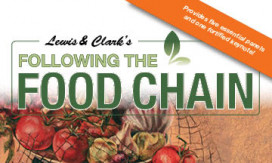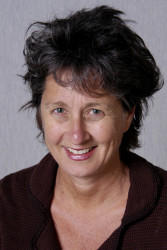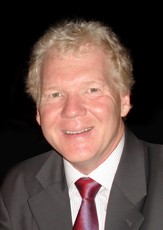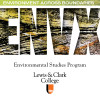2010 Symposium
Each year we offer a symposium on environmental affairs. 2010 marked the 13th annual event. Previous symposium programs can be found in the symposium archive. All Symposium events are free and open to the public.
The 13th Annual Symposium on Environmental Affairs: Following the Food Chain
October 11-14, 2010
Lewis & Clark College

No one can be removed from this debate - food is a basic need. No movement or system is universal, no plan is foolproof, and every chance we get to challenge our ideas is a chance to move past the status quo. The 13th Annual Symposium on Environmental Affairs provided an atmosphere of open discussion and constructive controversy in which food advocates and critics, scholars and businesses, and groups and individuals came together to chew on alternative food movements and the food system at large.
To learn more about each event, please click on the links below.
Monday, October 11
| 3:00-5:00 | Food Fair | SOA Lawn |
Tuesday, October 12
| 3:00-4:30 | Panel: The Food Eater’s Dilemma | Stamm Hall |
| 5:00-6:00 | Roundtable Discussion: You Are What You Eat | Stamm Hall |
| 7:00-8:30 | Panel: The Life of a Latte | Stamm Hall |
Wednesday, October 13
| 3:00-4:30 | Panel: The Politics of Labeling | Stamm Hall |
| 5:00-6:30 | Panel: Food Security & Insecurity | Stamm Hall |
| 7:00-8:30 | Keynote Dialogue & Debate | Council Chamber |
Thursday, October 14
| 3:00-4:30 | Panel: From Local to Global & Back? | Stamm Hall |
| 5:00-7:00 | Workshop & Banquet: The High-Hanging Fruit | Stamm Hall |
Workshop/Banquet
The High-Hanging Fruit: Possible Solutions to Food Chain Dilemmas
Thursday, October 14
5:00-7:00 PM
Stamm Hall
Our final symposium event was an interactive workshop in which panelists and attendees examined our solutions to food-chain problem, and worked through issues brought forth from this week’s discussions, deliberations and debates over dinner. This informative and provocative “food for thought” dining experience was put on with the help of Bon Appétit, various faculty and students, and a handful of panelists.
Food Fair
Monday, October 11
3:00-5:00 PM, SOA Lawn
This event drew local vendors, restaurants, businesses, breweries, advocacy/labor groups, and other food related organizations in the Portland area that seek to change the way food is viewed, consumed and produced! Portland is lucky to be located in the mecca of alternative food movements, with everything from vegan street-corner food carts to closed-loop organic breweries, and the rest in between. All of these businesses, as well as advocacy groups, labor unions, and food-awareness organizations are making changes in existing philosophies of how food “should be” produced, distributed, and consumed. In the context of this year’s Symposium, they all have something to contribute to our investigation of the food system and growing alternative movements. In hosting this event, we hoped that we were able to spark symposium-related discussion amongst attendants.
Keynote Speakers

Her first book, Agrarian Dreams: the Paradox of Organic Farming in California, won the Frederick H. Buttel Award for Outstanding Scholarly Achievement from the Rural Sociological Society and the Donald Q. Innis Award from the Rural Geography Specialty Group of the Association of American Geographers. She is currently finishing up a book that looks at what is missing in the current conversation about obesity and good food, and at what cost to social justice (University of California, forthcoming, 2011). A teaser commentary on this topic, “How Michael Pollan, et al. Made Me Want to Eat Cheetos,” can be found in the Summer 2007 issue of Gastronomica: The Journal of Food and Culture. Despite her critiques, Julie admits to her foodie predilections. Besides food, she enjoys bluegrass music and women’s volleyball.

Media
This page collected all media related to the 13th Annual Symposium on Environmental Affairs, Following the Food Chain.
Visit the Following the Food Chain Facebook group.
Learn more about LC student Jonah Luke, who performed at the Symposium Food Fair on Monday, October 11.
Read a profile of the Symposium from the Lake Oswego Review here.
Read a blog post by “Life of a Latte” panelist Kumar Venkat on environmental impact.
Panels
Tuesday, October 12th
The Food Eater’s Dilemma
3:00-4:30 PM
Stamm Hall
Omnivores and carnivores are posed with the challenges of making environmentally and socially justifiable food choices at every meal and grocery outing. However, is solving those problems as easy as choosing organic over conventional foods, or tofu over turkey, or fresh over nonperishable, or even local over global production? What factors weigh in to making food choices? Which ones should we pay attention to, and does it depend on whether we view our food choices as a form of environmentalism? The choice of what to eat is also the choice of where to find it; before we can choose what to eat, we must begin with where we eat. What do the groceries, gardens, restaurants and other suppliers say about the movements and ideals we buy into and, specifically, how does that affect our role within the green movement?
Participating panelists: Camas Davis (Portland Meat Collective), Betty Izumi (Portland State University School of Community Health), Will Newman (Oregon Sustainable Agriculture Land Trust), Blake Van Roekel (Slow Food Movement & Good Keuken)
You Are What You Eat (Roundtable)
5:00-6:30 PM
Stamm Hall
This roundtable discussion was a follow-up to the preceding panel in which participants were organized into groups and asked instigative and challenging questions. What do our own food choices say about us? What factors play into even the most minute of decisions when it comes to food? Where does the information that we value really come from? How are we influenced by labeling, our peers, or the popularity of certain food choices? Is food a social statement? These questions were directed at the individuals attending the roundtable to help them situate themselves in the context of the symposium and begin thinking about why they eat the way they do.
The Life of a Latte
7:00-8:30 PM
Stamm Hall
Coffee plays an integral role in the lives of many members of the Lewis & Clark community. In this panel, we attempted to put our morning cup of coffee into a broader social and ecological context, exploring how supply chains impact producers, distributors, and consumers. How does growing coffee impact the ecology of the land? How do relationships between producers and distributors support or undermine the health of communities? How is coffee marketed to consumers in the United States? Why are we willing to pay so much for a latte? How efficiently is coffee produced and consumed, and what impact does waste have on the supply chain? We investigated the feasibilty of a sustainable supply chain that stretches halfway around the world, and discussed problems and prospects for using the international coffee trade to set new precedents for structuring trade relations between first and third world countries.
Participating panelists: Aleco Chigounis (Stumptown Coffee), Bob Goldman (Lewis & Clark College), Kumar Venkat (Clean Metrics)
Wednesday, October 13
The Politics of Labeling
3:00-4:30 PM
Stamm Hall
Labels, supposedly, tell us everything we need to know about a product; ingredients, calories, certifications, awards, flavors, and more can all be communicated to, and understood by, the consumer. But when you only know how to pronounce five of the twenty ingredients on the label, what good is it really? How do labels enlighten or disillusion the consumer? What goes into certifying a label and passing regulation? How well monitored are food certifications? What does it mean to be organic, and why is the organic term so controversial? How does the organic label subordiante conventional farming? Has the organic label hurt or helped the environmental movement for “green” food? How has the organic label been normalized for those who can afford it? What does the lack of extensive labeling beyond the United States and Europe say about the role of government in determining the transparency of food industries?
Participating panelists: Matt Buck (Food Alliance), Julie Guthman (author of Agrarian Dreams), Dan Jaffee (author of Brewing Justice)
Food Security and Insecurity
5:00-6:30 PM
Stamm Hall
The world currently produces over 4,000 calories per person, per day. The average recommended intake, though, ranges from 1,800 to 2,500 calories per day, yet billions starve while others eat in excess. How is distribution determined, and who gets a say? How does this contribute to the food security of some and the insecurity of others? How are food aid and free trade used to bolster or undermine food security? How are these issues related to the overproduction of certain kinds of food in various places? Producing much of this food requires enormous petrochemical inputs. As the immediate supply of fossil fuels becomes more scarce, what impact will this have on global food security? In addition, how is the use of conventional foods (such as corn) for alternative energies, animal feed, and other “inedible” uses, contribute to food insecurity? What role do subsidies play in dealing with food security and insecurity? Can re-examining food waste and inefficiency serve as a solution to environmental and hunger problems facing the world?
Participating panelists: David Austin (Mercy Corps), Andy Fisher (Community Food Security Coalition), Mike Moran (Oregon Food Bank)
Thursday, October 14
From Local to Global & Back?
3:00-4:30 PM
Stamm Hall
The “global vs local” debate has been applied to environmental problems and solutions across the board, from energy production to waste issues. Food, as something that has traditionally been regarded as something intimate and local, is a subject in which defining appropriate scales for production and distribution is increasingly difficult. Doing so raises questions that span time and place: which parts of our food system need to be changed, and which are most efficient? To what degree do these chains need to be adjusted? When is large-scale agriculture most and least appropriate? How can conventional large-scale agriculture be redesigned to promote wiser use of resources? In prioritizing alternatives, how do we implement these without losing integrity and efficiency? Are some alternative food movements inherently limiting? To what extent is local self-sufficiency a feasible and desirable solution?
Participating panelists: Steve Cohen (City of Portland Bureau of Planning & Sustainability), Scott Frost (Nature’s Fountain Farm), Maisie Greenawalt (Bon Appetit)
Environmental Studies is located in room 343A of John R. Howard Hall on the Undergraduate Campus.
MSC: 62
email envs@lclark.edu
voice 503-768-7790
fax 503-768-7620
Symposium Advisor Jessica Kleiss
Environmental Studies
Lewis & Clark
615 S. Palatine Hill Road MSC 62
Portland OR 97219
